I am a single woman living in London and like many people in their early twenties, I’m on Hinge. Hinge, for me, is the trenches. However, just when I thought it couldn’t get any worse, I began to witness the emergence of a new trend; the fetishisation of neurodiversity. If, like me, you spend any significant time scrolling through matches on the app, you might have noticed it too- prompts about ‘looking for…’ “a woman with a touch of autism,” or that they’ll ‘brag to their friends if…’ “you’re a little bit ADHD”. So why are people seeking out neurodiverse matches? What is so appealing about Autism and ADHD in a partner? And why is this dating standard ultimately damaging to neurodiverse individuals?
Glorification, Oversimplification and Fetishisation
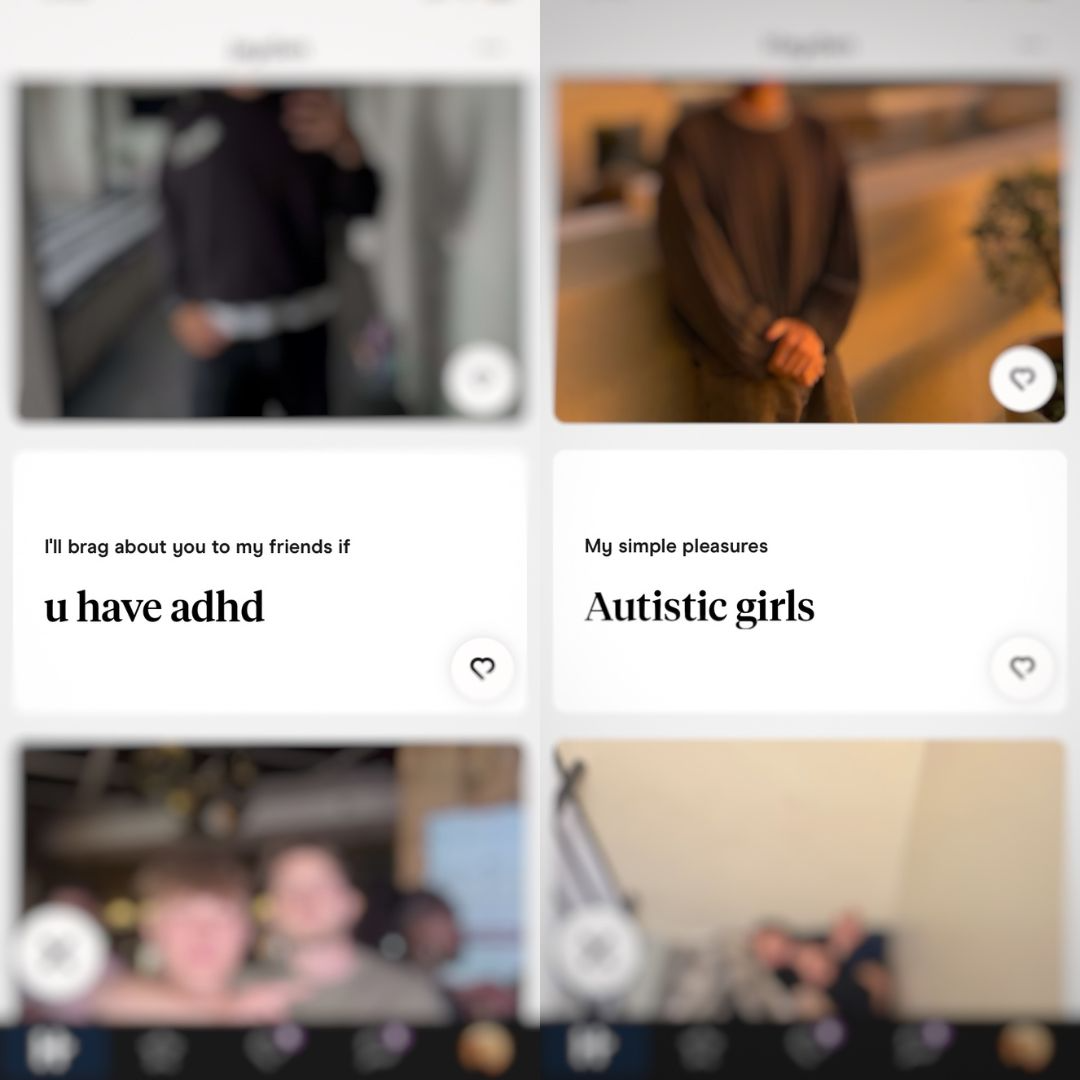
In these examples, neurodiversity is oversimplified and then this idealistic version is fetishised. The prompts often say that bachelors are searching for or in desire of ADHD and autistic women. They actually desire specific traits associated with these conditions, seeing them as inherently positive or sexy. ADHD may be desired as women sufferers are perceived to be spontaneous, hyper-focused or always on the go. Autistic women may be desired because they are perceived to be unconventional, often having special interests or hobbies and being alternative. Some individuals might express a certain fascination with these aspects of neurodiversity but this is a huge oversimplification of both conditions. The average Hinge-using male might not be entirely at fault for their lack of knowledge about neurodiversity. But, issues arise when these ‘quirks’ of ADHD and autism are commodified and fetishised. For instance, while someone might desire a woman with ADHD’s hyperfocus, they ignore her struggles with disorganisation or time management. While they long for an autistic woman’s unique perspective, they fail to acknowledge her difficulties with social reciprocation, which can lead to miscommunication and being unfairly labelled as cold or rude. These selective desires romanticise neurodivergence while ignoring the very real challenges that come with it.
Just A Touch Of 'Tism'
The amount of this phrase ‘slightly autistic women’ was shocking
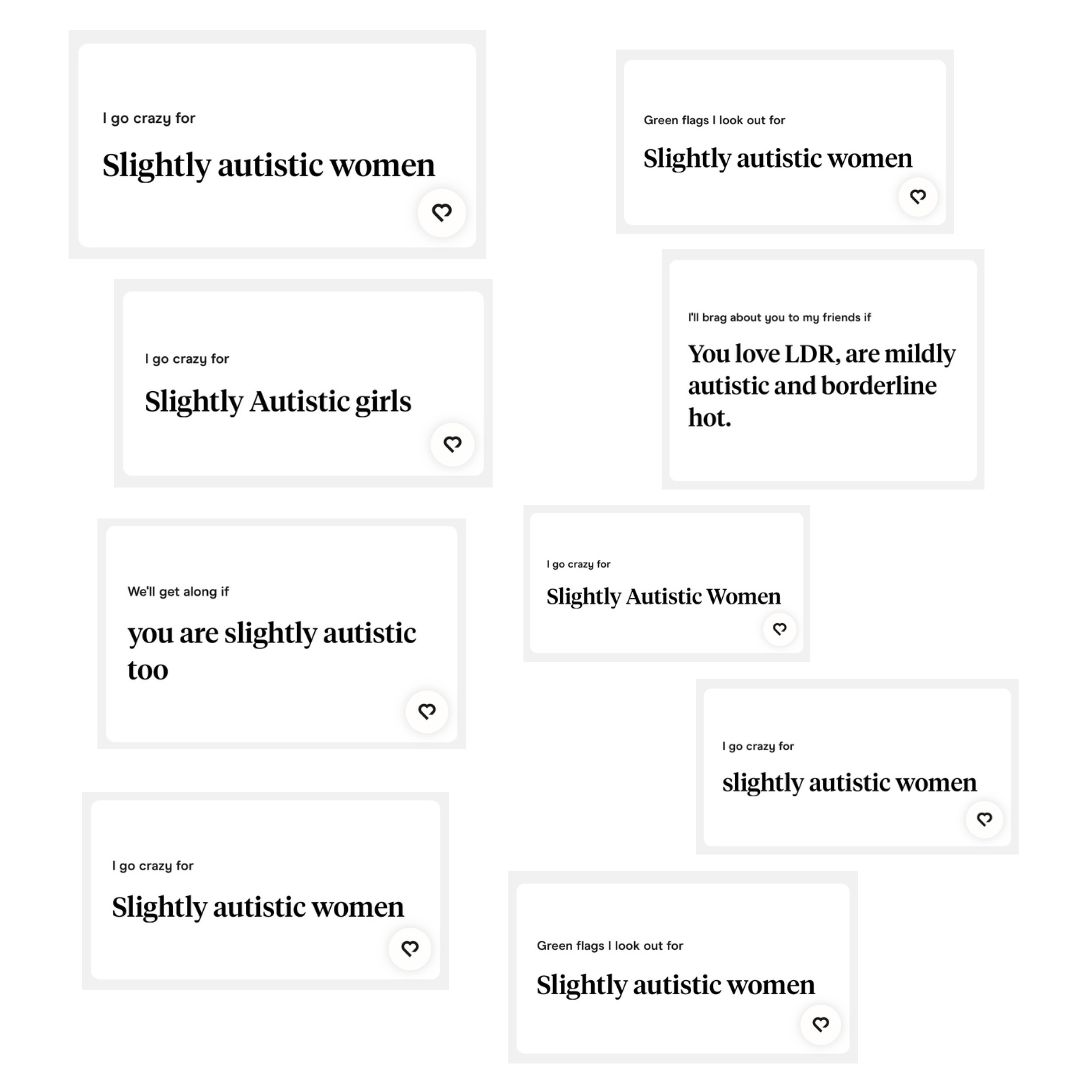
When users express a desire for neurodivergence, it's often framed as wanting "just a touch." They want someone who is "a little bit autistic" or "ADHD-coded" but not someone who actually experiences the full spectrum of those conditions. This is choosing when neurodivergence suits its cherry picking when it works for the desirer and it’s disregarding the struggle of neurodiverse people. Somehow, a ‘touch’ or a small amount of neurodivergence is attractive, but too much of it is not. This perpetuates the narrative that neurodiversity is interesting, edgy and different, when there's a convenient amount of it. This phenomenon speaks to Gen-Z’s desire for the ‘other’: where some individuals are drawn to the perceived differences and unique experiences of those with ADHD or autism, viewing them as exotic or intriguing, whilst avoiding the difficult reality of neurodivergence. There’s growing social capital in being ‘not like the others,’ unique, complex, somehow broken but beautiful- treating neurodivergence like a personality accessory rather than part of a lived reality. It is something to be performed or consumed- not understood.
When The Fantasy Collapses
So what happens after the initial ‘quirky’ attraction fades? After matching, meeting and dating, the reality of neurodivergence might not match the idealised version a Hinge user had in his head. This often leads to real disappointment. The same man who was looking for your ADHD ‘chaotic energy’ will inevitably be less impressed when you start arguments with them because of your impulsivity and emotional disregulation. ADHD and autism are conditions which affect how a person thinks, processes information, and interacts with the world around them. Someone with ADHD may struggle to stay focused during conversations, forget plans and seem distracted. This can make their partner feel ignored or undervalued. Emotional regulation can also be difficult, leading to impulsive reactions or intense mood swings during a conflict. A person with autism may find it hard to interpret social cues, express emotions conventionally or navigate the unspoken expectations of romantic relationships. Sensory sensitivities or a need for routine can also make dating environments overwhelming or unpredictable. Both conditions exist on a spectrum and vary widely between individual sufferers, and also in how they present themselves between men and women.
Flippancy, ‘Me Too!’ And Neurodiversity As A Dating Selling Point>
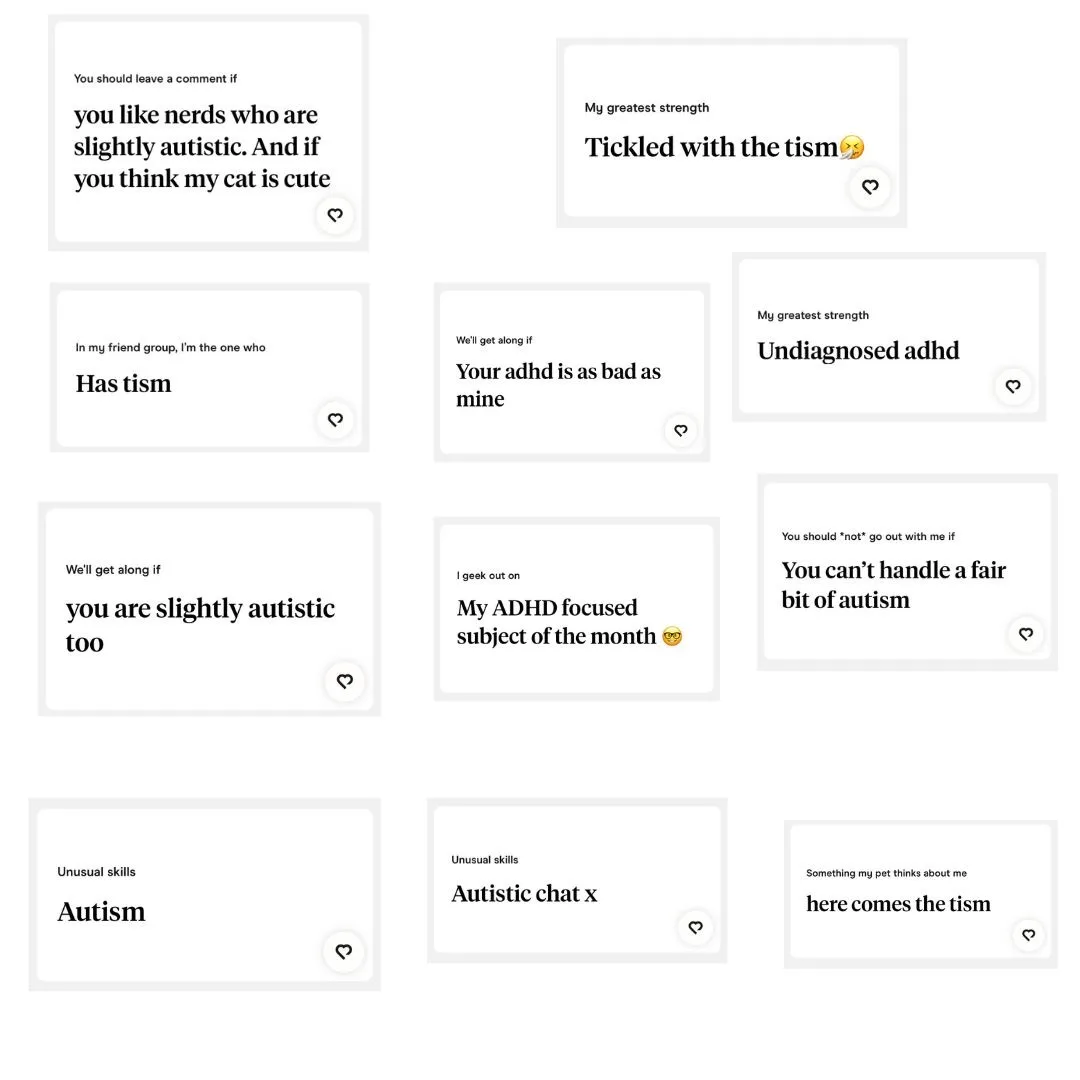
Not only are we seeking it out- apparently we’re using it to advertise ourselves too. The amount of profiles I’ve seen that advertise their apparent ADHD or autism and use it to entice potential matches has also shocked me, which means that we also think its desirable to others too. I would seriously question the validity of each profiles diagnosis, since their words are used so flippantly. More people than ever before are being diagnosed as neurodivergent. So much progress has been make in term of normalising mental health conditions and neurodivergence. As a society, we have removed so much of the stigma around talking about them. However, the downside of this is that more people are happy to throw around terms like ADHD and autism, when in reality they may not have an official diagnosis.
We often hear- “I’m OCD about tiding my house,” or “that literally made me so depressed,” and ADHD and autism aren’t exempt from this casualisation, people often label traits that they have as both conditions- “I can’t sit still, I have ADHD,” or “I’m lowkey on the spectrum.” This presentation of supposed neurodivergence on our Hinge prompts, out there as the first thing a potential match might see, is surprising considering what I have already labelled as the difficulties neurodivergent person might have when dating. These claims appear right at the top of their Hinge profiles, suggesting that neurodivergence isn’t just tolerated, instead it’s a selling point. If someone is marketing their own neurodivergence, it's clear they believe it holds some level of dating appeal.
The line between curiosity and objectification
There may be situations where a man expresses genuine curiosity about what it’s like to date someone who is neurodivergent. However, there is a difference between being curious about someone’s mind and viewing their diagnosis like a collectable. To truly appreciate neurodivergence in a partner is to accept the highs and the lows, the charm and the challenge. Neurodivergent people are individuals whose realities deserve empathy, not aestheticisation.
What does the future hold?
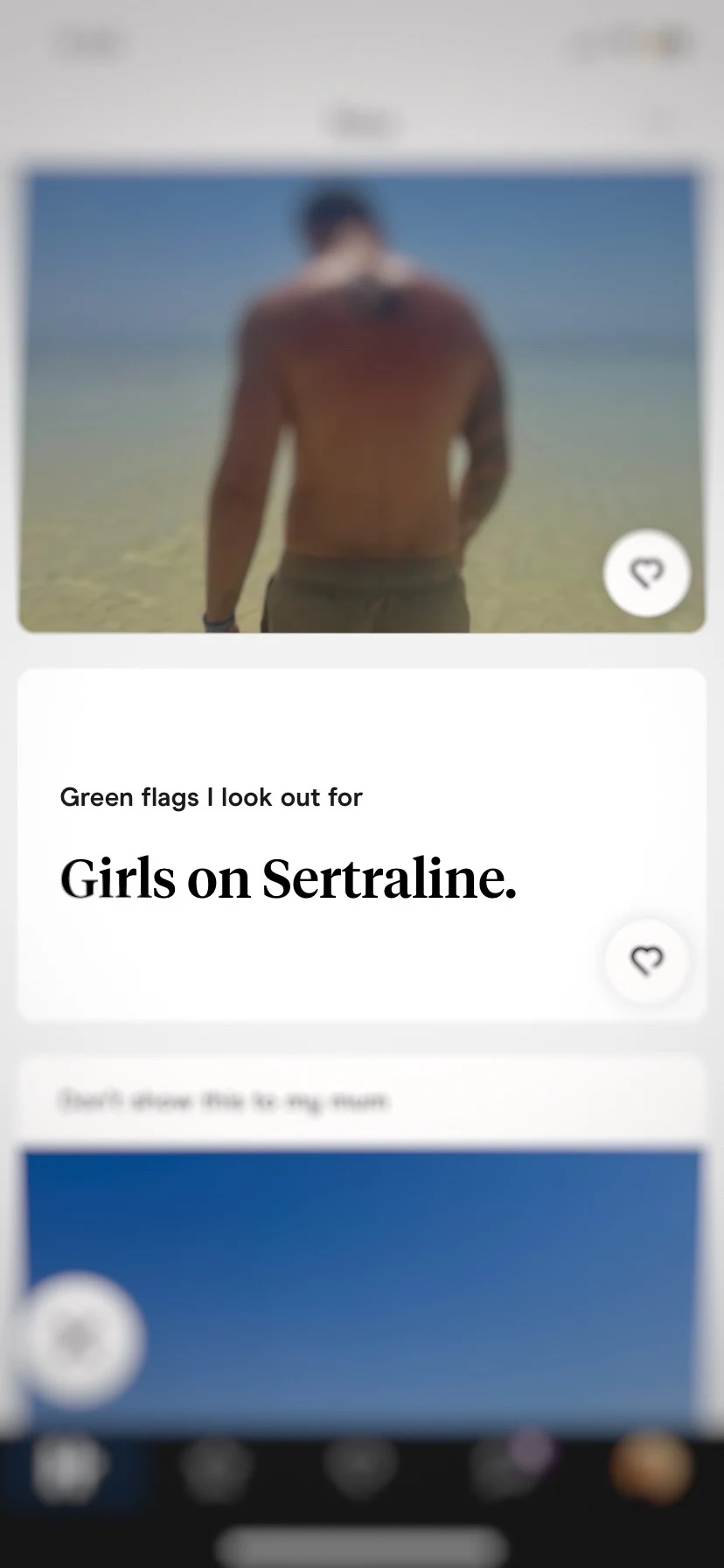
Finally, I wish to leave this image here. Sertraline is a medication often prescribed for depression and anxiety. Where does fetishisation stop? What aspects of identity are we turning into dating criteria, and which previously stigmatized traits are we now flaunting our preferences for without shame? Will more and more profiles like this appear?
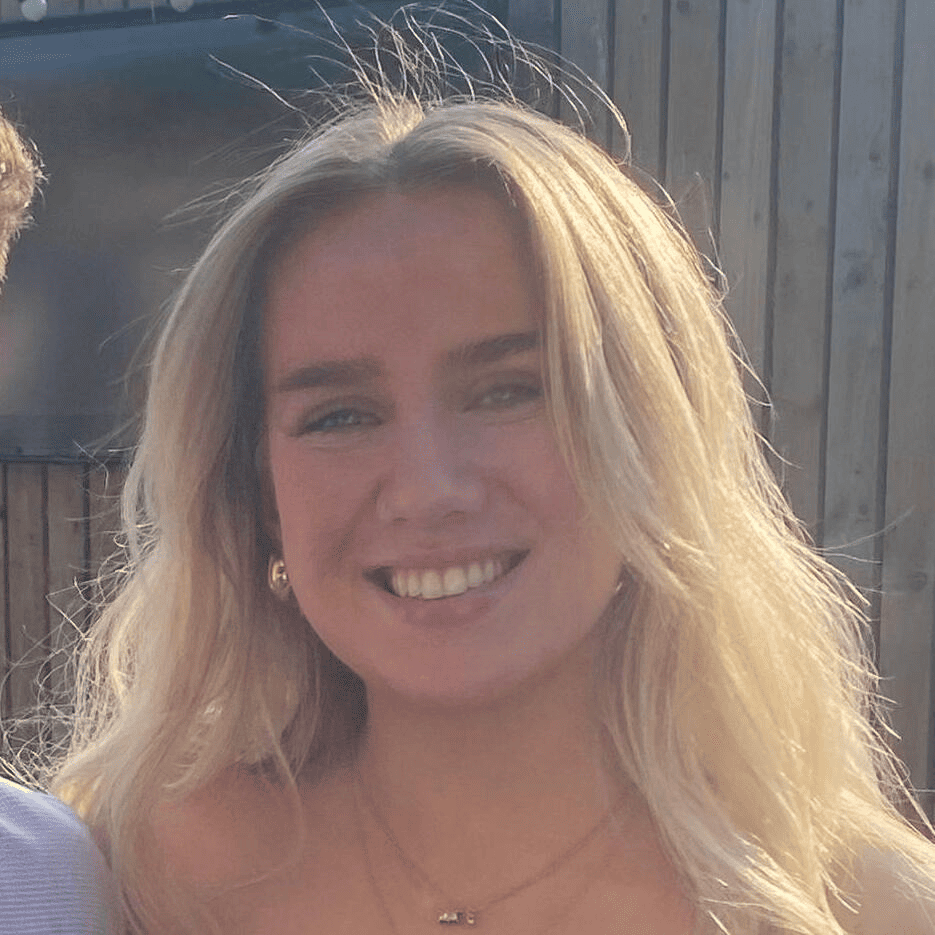 Emma
Thewlis
Emma
Thewlis